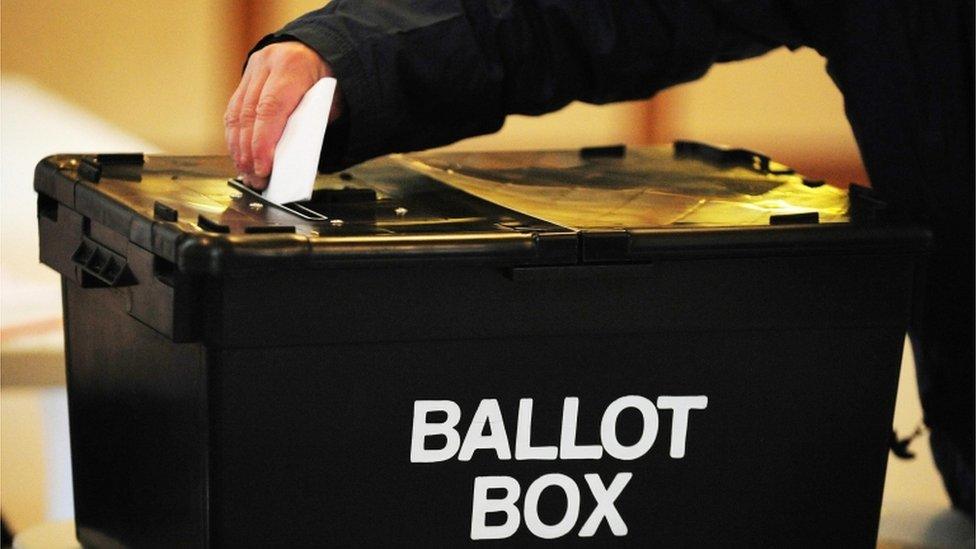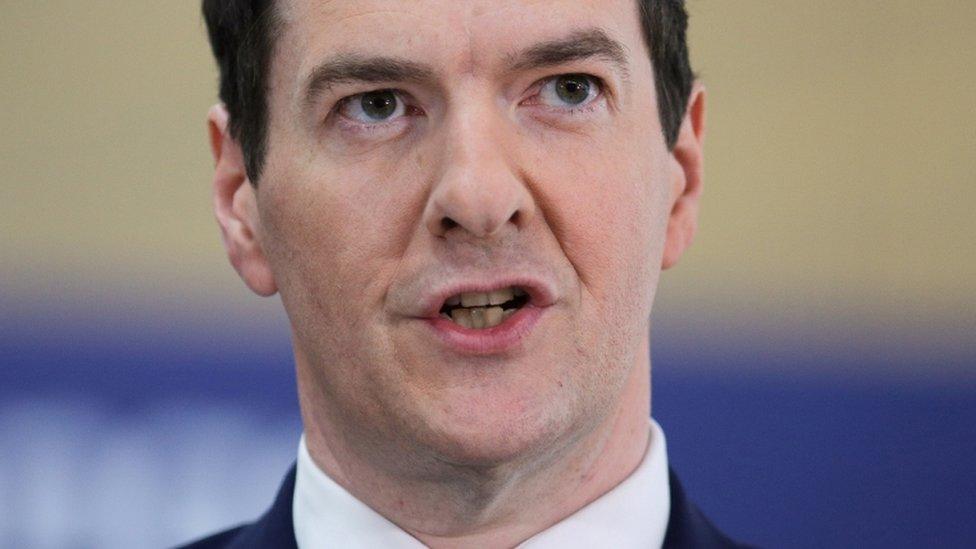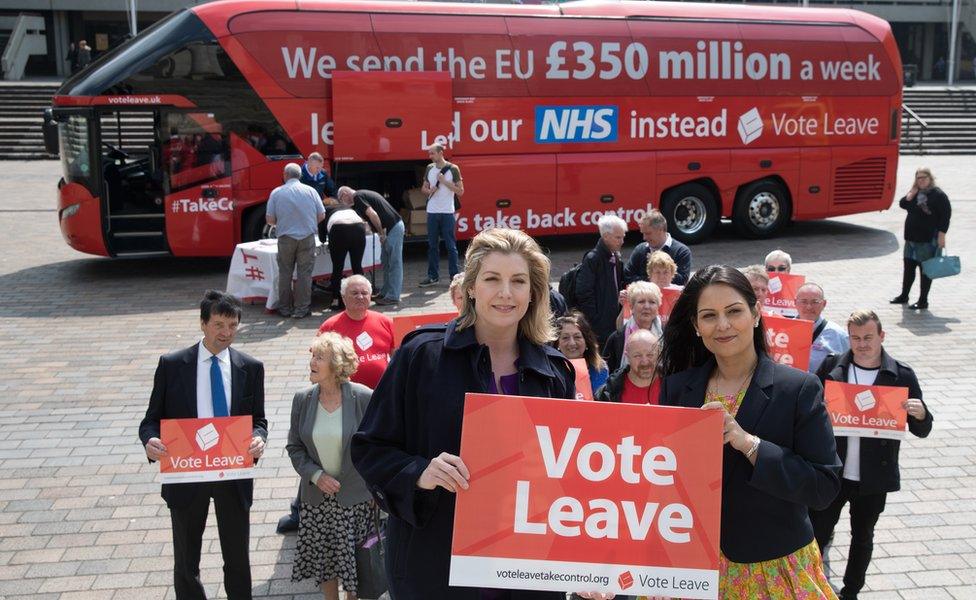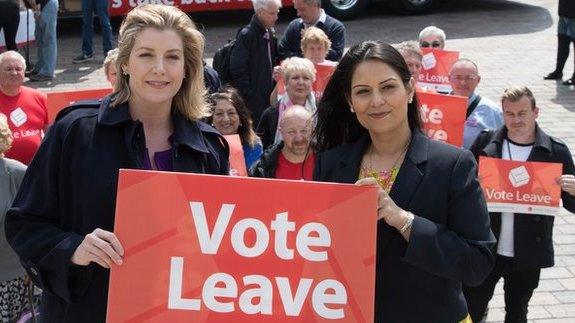Could EU referendum damage our democracy?
- Published

With a month still to go, I know many British voters are already profoundly turned off by the EU referendum.
The mudslinging, the rows, the nonsense - it does not always look very edifying.
But I am beginning to wonder what this extraordinary plebiscite will do for our democracy in the longer term.
Once the votes have all been counted, what impact will the referendum have on our respect and enthusiasm for the political process?
You may be surprised to know that I think it might prove a good thing.
But, then again, it could be a disaster.
Faith in politicians has never been high, and pollsters report that these days only one in five of us trusts MPs to tell the truth.
This figure is unlikely to have been improved by a campaign that has seen senior political figures on both sides of the debate shamelessly throw mud and dubious claims around with abandon.
The BBC's Reality Check and other fact-checking organisations can help people navigate their way through some of the arguments, but their conclusions are hardly going to restore confidence in the quality of our political discourse.
The UK Statistics Authority, which acts as a referee to stop politicians abusing official data, has had to intervene already.
Voters tell me again and again that they just want the facts.
But the referendum has demonstrated that such things are elusive and rare.
However reliable, every "fact" can be disputed or dismissed, its source questioned or rubbished.
George Osborne defends Treasury's gloomy EU exit forecast
Would Brexit mean extra £350m a week for NHS?
The UK's EU referendum: All you need to know
In this referendum, some of our most respected institutions have found themselves accused of being self-serving or biased, prepared to twist the truth to serve their purpose.
Broadcasters are used to such allegations, often from both sides of an argument simultaneously. But the Bank of England? The Institute of Fiscal Studies?
These are organisations that trade on their respected objective analysis, and it must be discombobulating to find their reputations blithely trashed on the evening news or their careful arithmetic given a D-minus in a newspaper column.
What will the effect of this be after the referendum?
Well, it might mean we find the truth even more elusive than it is now.
If we trust no-one, what hope is there for a coherent debate about anything?
Issue of trust
It would be a tragedy if one consequence of the EU referendum campaign was to create a country where official statistics and established institutions were trusted less than the saloon-bar bore.
Or it could be that we start having a more sophisticated discussion about the nature of evidence.

Claims made by George Osborne's Treasury about the financial impact of Brexit have been called into question
We may be made to think harder about the assumptions we make, the numbers we use, the conclusions we draw.
And organisations that offer intelligence on such matters may be obliged to be more transparent about their methodologies and more honest about their shortcomings.
Many voters are loyal to a particular party, a political tribe they rely upon to do the policy heavy-lifting and they trust to champion their cause.
But the EU referendum has left them, as one undecided Tory told me in Worcestershire, all at sea.
With divisions in both Conservative and Labour parties, the debate has wandered off familiar political tribal paths and into the dark jungle.
If people care about the question at the centre of this referendum, and most say they do, they have to do their own homework, test the arguments themselves and make up their own mind.
It may be irritating, but I do wonder whether this is actually a force for good.
Blind allegiance to political parties can result in passivity and cynicism - toxic elements in the democratic process.
Passionate arguments from head and heart have been ignited by this referendum, inside political parties and often inside individual voters.
And that must be positive.
Politicians tell me how amazed they have been by the crowds that have turned up for referendum debates.
People are thirsty for information and understanding.
Mark Easton asks undecided voters what would sway them in the EU referendum
A couple of weeks after a discussion for a BBC News report on the referendum, I met up again with some of our jury of undecided voters in Lichfield, Staffordshire.
They all confessed to having scoured the internet for facts and figures after the first programme, and I am sure they are far from alone.
Voters want simple answers - but real life is complex, and the referendum is making the electorate recognise that.
Both options carry risks.
The immigration debate has been crude and poorly informed for many years.
But in the past few weeks, the discussion has begun to focus on the trade-offs involved, to engage with the complexity.
It feels like a much more grown-up conversation than it was.
The same is true of debates about international trade, workers' rights, human rights, security and, of course, the power and propriety of the European Union itself.
Our national discourse is getting down into detail we normally skate over.
That must be a good thing too.
The question that sits at the very heart of the referendum is also one we don't talk about enough - what kind of country do we want to be?
It is a topic that can feel irrelevant or whimsical.
But right now it feels fundamental.
We know that there is deep disillusion with big party politics, the so-called Westminster elite accused of disregarding the concerns of ordinary people.
It is a phenomenon replicated in many other developed Western democracies.

Vote Leave's claim that leaving the EU would save the UK £350m a week has also been challenged
The standing of traditional political structures is so low that in some countries tub-thumping populists can get away with making up the facts as they go along while dismissing unhelpful evidence as part of an intellectual plot.
During this EU referendum campaign, some voices have got pretty close to doing the same.
So the big question for our democracy and the quality of our governance is whether the referendum has further damaged respect for politics and politicians or encouraged a new wave of political engagement and understanding of complexity.
One might argue that that question is just as important for the future of the UK as the EU referendum itself.
- Published25 May 2016
